After 4 months stuck in a South Korean airport this Russian is still not free. But his alternative is far worse | CNN
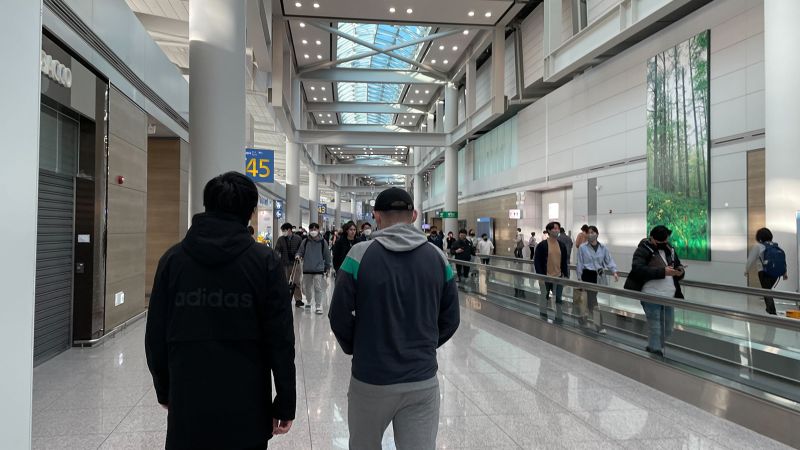
Seoul, South Korea
CNN
—
After spending close to five months stuck inside an airport in South Korea, Dmitry is finally able to breathe fresh air. But he is yet to taste freedom – and his real wait may have only just begun.
He is one of five Russian men who became stranded at Incheon International Airport last year while trying to flee Moscow’s military mobilization order for its war in Ukraine. The South Korean Justice Ministry refused their applications for refugee status, effectively leaving them in limbo at the airport.
Too scared to return to Russia, they resorted to sleeping rough at the airport, living on handout meals from the South Korean immigration department.
Dmitry (not his real name; he asked to remain anonymous for fear of retribution if he is sent home) and one other of the men were allowed to leave the airport this week and were checked into a government holding facility – the Immigration Reception Center – while their dispute with the ministry continues. The other three remain in the airport. It’s unclear why the men did not attempt to reach a third country once they realized the difficulties in South Korea.
Applying for refugee status here could take months or years and in the meantime, Dmitry will need prior approval if he wishes to leave the center and even then he will face a 6:00 p.m. curfew and must take a Covid test at his own expense. He will also not be allowed to work.
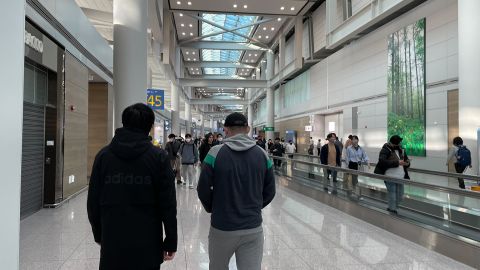
But for Dmitry this semi-existence is better than the alternative – even though he had to leave a wife and 7-year-old son behind in Russia.
“I miss my boy really badly,” said Dmitry, 30, lamenting that his son does not understand why he had to leave. He is too emotional to say anything else about his family.
Dmitry fled Russia in October of last year after President Vladimir Putin called for a mobilization of 300,000 men to join the war in Ukraine. He was one of hundreds of thousands who left his home country in the weeks and months following the September 21 announcement.
He feared he would be among the first to be sent to the front line as he has a record of dissent.
“I felt terrible because I have protested at anti-war rallies… I decided then I need to leave Russia,” he said, adding that six of his friends had already died in Ukraine.
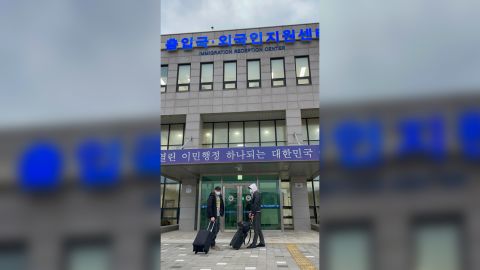
His first plan was to head to Kazakhstan, but he changed his mind when he heard the country was deporting fleeing Russians.
South Korea was the one democratic country he could fly to at the time, he said, though he is aware that the country does not look kindly on those trying to avoid military call-ups – given it has its own mandatory military service of at least 18 months that most men must carry out by the age of 28.
“I’m not a draft dodger, I’m against the war,” he said, a message he wants officials here in Seoul to hear. “I don’t want to go and kill people essentially, so I’m not a draft dodger.”
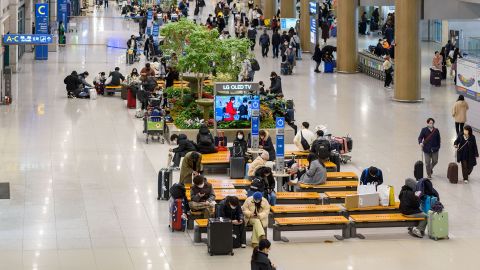
Until this week, his life in Seoul had largely consisted of a minimal routine of a hot bun and juice for lunch and chicken and rice for dinner provided by immigration with nothing to fill the hours in between but to walk around the airport, surrounded by a constantly changing stream of business travelers and holidaymakers.
He would wash his clothes in a public bathroom sink and says there was no hot water for a shower for the past month, a complaint the immigration department disputes.
“No hot water now, already for one month. I turn on the hot water, but nothing’s coming out,” he says in a video he recorded to back up his claim. He said that in the airport he slept on the floor in a small room with 15 other asylum seekers.
At the government center, things are markedly better. “The conditions here are very good, they feed very well, there is a washing machine, there is an iron, there is hot water, everywhere is clean and everything treats you very well,” he said.
Dmitry’s asylum application is far from simple. He won the right to apply for refugee status last month, after successfully challenging the Justice Ministry’s decision at the Incheon District Court.
However, the ministry said this week it would appeal that decision.
His lawyer said it could now be another five months before he even learns if he has the right to apply. Even then, success is far from guaranteed given the tiny fraction of refugee applications South Korea accepts.
In 2019, before the Covid pandemic limited the number of applicants arriving in Seoul, only 79 of almost 15,500 applicants were granted refugee status.
“Even the US has a refugee approval rate of almost some 10%,” said his lawyer, Lee Jong-chan. “But it’s less than 1% on average in South Korea. South Korea’s refugee approval (rate) is like a needle hole, so I’m not sure whether it would be easy to thread that hole. We’ll do our best, but I think it’ll be difficult in South Korean reality.”
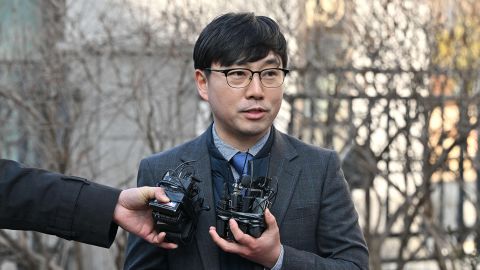
Lee said Dmitry’s best chance at winning asylum lay in this argument: “An objection to serve in the military while in wartime applies to ‘persecution due to political opinions,’ which is one of the five reasons people apply for refugee status.”
But it’s likely to be a long process whatever happens. The lawyer estimates a wait of around five months to learn if they have the right to apply for refugee status, then a further one to two years before they know if they can gain it.
If the application is rejected, Dmitry may still be able to stay in the country under a humanitarian stay permit – though that would have its own drawbacks.
Lee said “those with humanitarian stay status are excluded from most of the benefits South Korean residents or refugees get. They won’t be put in a position where they are forced to leave, but they’ll have to live in South Korea with a lot of restrictions.”
However, that might still be better than the alternative. Lee said that media attention meant their case was now well known in Russia, so the men could be in even greater danger should they be deported.
If he can’t find sanctuary in South Korea, Dmitry said he would consider asking the embassies of the United States and Canada to consider an asylum bid.
But even if any of these countries were ultimately to accept him, Dmitry would remain torn.
He said he never thought he would leave Russia as it is his home and he still holds out hope he will be able to go back one day.
“It would be great if I could return home to Russia,” Dmitry said. “That would mean everything that’s going on would have ended, so the sooner the better.”
Share this news on your Fb,Twitter and Whatsapp
Times News Network:Latest News Headlines
Times News Network||Health||New York||USA News||Technology||World News